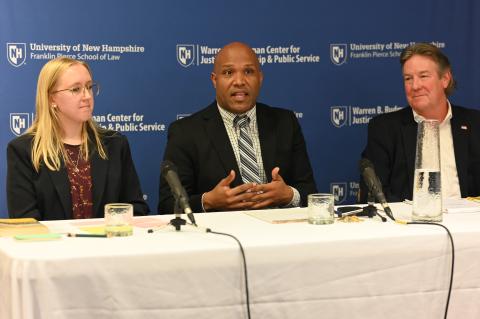A Tale of Two Constitutions: Legal Experts Discuss Power Struggles Involving the U.S. and N.H. Constitutions
What is the impact of being governed by two constitutions – our state constitutions and the federal constitution? This was among the questions explored during Constitutional Dynamics: State vs. National Governance, a recent panel discussion presented by NH Civics and the Warren B. Rudman Center for Justice, Leadership & Public Service.
Constitutional Dynamics Panelists:
- Haley DeYoung, Program Manager at JAG-NH, and former middle and high school social studies teacher.
- Julian Jefferson, Clinical Assistant Professor at UNH Franklin Pierce School of Law and former attorney for the NH Public Defender.
- Ovide Lamontagne, Senior of Counsel with Bernstein Shur and Chair of the NH Commission on Civics Education.
The panel was moderated by Laura Knoy, the Rudman Center’s Community Engagement Director.
Watch the full event here (Excerpts have been edited slightly for clarity.)
Although confusing at times, being governed by two constitutions is, overall, beneficial, said Professor Julian Jefferson. “What some people don’t realize is that the U.S. Constitution provides a floor. That is, you can go no lower than that in guaranteeing somebody’s rights. But the lion’s share of the work being done to protect your individual rights and to advance what it means to have rights as an American citizen is really done in the 50 states. They are the individual laboratories that advance who we are as we become this more perfect union.”

Panelists Haley DeYoung, Professor Julian Jefferson, and Ovide Lamontagne
Besides setting up the basic mechanisms of government, what is the purpose of a constitution, federal or state?
“In our revolutionary America, and we still are revolutionary, we believe that all powers derive from the people. The constitution is the mechanism that establishes the rule of law for a state and for the federal government because of the delegation of power by the people to either representatives or directly,” said Ovide Lamontagne. “It’s so important that Americans and New Hampshire citizens understand that they hold the power over government. The constitution establishes the rule of law and essentially says what the government can and cannot do. It’s a limiting document. I would call it a system of dual sovereignty. There are two constitutions working in tandem but not necessarily overlapping.”
What is a common misconception about the relationship between the state and federal constitutions?
“A lot of citizens think that the federal government is preeminent, and that the states are subordinate, are subdivisions of the federal government. That is not the case. It’s just the reverse in this sense: That the states delegated authority to the federal government by ratifying the constitution to do certain things but not all things, and we have our own independent jurisdiction. We have the ability at the state level to do things that the federal government doesn’t have the ability to do because it wasn’t delegated that authority,” Ovide Lamontagne said. “The supremacy clause essentially says if there’s a conflict between delegated powers of the federal government and those of the state, the federal government is in control. They have final say on some things, those things delegated to the federal government to handle, but not things beyond that.”
State constitutions often guarantee more rights than the federal constitution. What are some examples of state constitutions going further in protecting certain rights?
“In New Hampshire, in the criminal procedure world, the most famous case is ‘you have a right to privacy in your trash.’ That is the State v. Goss case. You are protected against unreasonable search and seizure under the Fourth Amendment,” said Professor Jefferson. “The United States Supreme Court would never say that you have an expectation of privacy in your trash. The state of New Hampshire says, in New Hampshire, you do.”
“The police had rummaged through trash that had been put out at the end of a person’s driveway. The state’s argument was once that trash comes to the end of your driveway you no longer have the expectation of privacy,” Professor Jefferson said. “Our State Supreme Court has come in and said we understand the U.S. Supreme Court has taken a different view, but under our right to privacy, under the New Hampshire Constitution, you have not ceded that right to privacy. It is fundamentally wrong for a police officer to come to the end of your driveway and start rummaging through your trash.”
When did the Granite State get its own constitution?
“We actually had a constitution before the United States had a constitution,” said Haley DeYoung. “We are the first in America to have our own constitution. Basically, we kind of declared independence from Great Britain before America did. Back then, we had a governor named John Wentworth; he was liked for a while. But we get to the American Revolution and things get heated. He decided to send carpenters down to Boston, very hush, hush, to start building things for the British. New Hampshire citizens did not like that, and some people showed up at his house with some firearms and threatened him, and John Wentworth just up and left. So, New Hampshire said, ‘Well, I guess it’s up to us to figure it out for ourselves.’
“They had to send the constitution to all the towns to be ratified. People wanted so many amendments and changes. It was a wild ride here in New Hampshire, so to be able to complete it in less than three years was really incredible.”